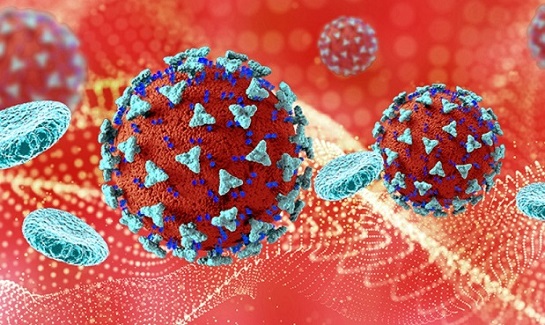Newer SARS-CoV-2 Variants Use T191 Mutation to Evade Autophagy and Strengthen Viral Survival
Nikhil Prasad Fact checked by:Thailand Medical News Team Jun 22, 2025 8 months, 1 day, 22 hours, 38 minutes ago
Thailand Medical News: Omicron’s Hidden Weapon Uncovered
A mutation called T191 in the envelope (E) protein of SARS-CoV-2’s Omicron variant is giving the virus a powerful new tool—resistance to autophagy, the body’s natural cellular cleanup system. Scientists from Ulm University Medical Center, Friedrich-Alexander University in Erlangen-Nürnberg, Technical University of Munich, and the Icahn School of Medicine at Mount Sinai have found that this mutation helps Omicron escape immune destruction, giving it an edge in spreading and surviving inside the human body.
 Newer SARS-CoV-2 Variants Use T191 Mutation to Evade Autophagy and Strengthen Viral Survival
Newer SARS-CoV-2 Variants Use T191 Mutation to Evade Autophagy and Strengthen Viral Survival
This
Thailand Medical News report highlights how the T191 mutation enhances the virus’s ability to block a key antiviral process. Normally, autophagy helps cells trap and destroy invaders like viruses. But Omicron’s altered E protein resists this process, shielding itself from degradation. This discovery not only explains the variant’s remarkable success but also raises new concerns about future mutations and therapeutic resistance.
Autophagy and the Body’s Cellular Defense
Autophagy is an essential part of the immune system that eliminates harmful cellular debris and pathogens by enclosing them in vesicles called autophagosomes and digesting them in lysosomes. In the case of SARS-CoV-2, autophagy should help destroy incoming virus particles. However, Omicron has developed a clever workaround.
By introducing the T191 mutation into the E protein of earlier virus versions from 2020, researchers found those viruses also became resistant to autophagy. Viruses without this mutation were easily degraded, but those with T191 survived. Essentially, this mutation serves as a biological shield.
Key Findings from the Study
Using lab-grown cells and genetically engineered viral strains, the researchers uncovered several critical details:
-
Resistance to Autophagy: Omicron variants such as BA.1, BA.5, and XBB.1.5 showed significantly reduced sensitivity to autophagy when treated with Torin-1, an autophagy inducer. The original 2020 strains and Delta were still highly susceptible.
-T191 Boosts Autophagosome Accumulation: Cells expressing the T191-mutated E protein accumulated more autophagosomes, signaling a block in the autophagy process.
-Direct Interference with Autophagy Proteins: The mutated E protein interacted more strongly with autophagy-associated host proteins like SNX12, STX12, TMEM87B, and ABCG2. This enhanced interaction disrupted the fusion of autophagosomes with lysosomes, allowing the virus to survive.
-Recombinant Virus Testing: When scientists introduced the T191 mutation into older strains, those viruses gained the same resistance to autophagy as
Omicron, even though their replication speed slowed slightly.
-Localization to Autophagic Sites: Imaging showed that the T191-mutated E protein had increased presence in autophagosomes rather than late endosomes, further confirming its role in blocking degradation.
-Infectivity in the Face of Autophagy: Using pseudoviruses, the study demonstrated that those containing the T191 E protein could still infect cells even when autophagy was chemically triggered, while others could not.
Why This Mutation Matters
The T191 mutation may explain why Omicron spread faster and caused more reinfections compared to previous variants. By resisting a fundamental immune defense mechanism, Omicron not only evaded antibodies but also dodged the body’s first line of defense—autophagy. This change likely contributed to Omicron’s global dominance and persistence, even in highly vaccinated populations.
Moreover, researchers observed that while T191 may slightly reduce replication speed, its benefits in immune evasion far outweigh this cost. As new Omicron subvariants emerged, many retained this mutation, confirming its evolutionary advantage.
Final Thoughts and Future Concerns
The discovery that the Omicron variant uses the T191 mutation to escape autophagy presents a troubling insight into how SARS-CoV-2 continues to evolve under immune pressure. Unlike antibody evasion, which can be countered with updated vaccines, evading innate immune processes like autophagy could make future variants harder to fight.
The study also suggests that this mutation may only be one piece of a broader strategy used by SARS-CoV-2, as other viral proteins like ORF3a and ORF7a also manipulate autophagy. Together, these adaptations could reshape the virus’s behavior in humans, particularly in long-term infections or in those with weakened immunity.
This revelation underscores the urgent need for next-generation therapies that target not just the virus itself, but its ability to hijack our innate defenses. Scientists will now need to explore whether T191-like mutations exist in other emerging variants and how this knowledge can be used to create more robust treatments.
The study findings were published in the peer reviewed journal: iScience
https://www.sciencedirect.com/science/article/pii/S2589004225012350
For the latest COVID-19 News, keep on logging to
Thailand Medical News.
Read Also:
https://www.thailandmedical.news/news/orf8-secretion-loss-highlights-hidden-mutations-in-sars-cov-2-variants
https://www.thailandmedical.news/news/despite-debut-of-new-sar-cov-2-ba-3-2-variant-with-50-plus-mutations-nb-1-8-1-and-xfg-will-prevail-in-weeks-ahead
https://www.thailandmedical.news/news/nucleocapsid-r204p-mutation-in-sars-cov-2-omicron-xec-lineages-and-recombinants-enhances-inflammation-and-severity
